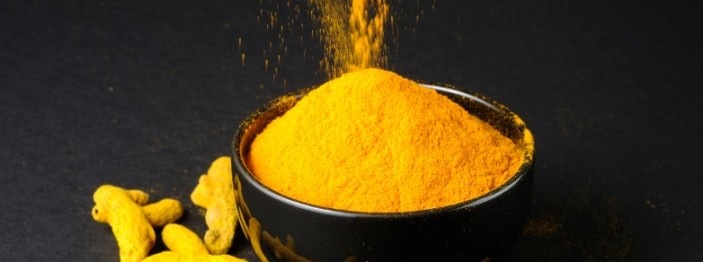Curcumin: does it work in multiple sclerosis?
Curcumin is the active ingredient of turmeric, the yellow spice that’s commonly used in Indian cuisine and medicine. Many claims have been made about curcumin’s ability to fight disease, including autoimmune disorders such as multiple sclerosis. So it’s worthwhile to take a closer look to see what the science can tell us about the spice.
Research proceeds along a well-trod path, from the test tube, to animal studies and then to human studies. In a test tube, curcumin appears to have some very interesting characteristics. Laboratory studies have shown that curcumin can modulate the expression of immune cells (CD4 and CD8 T cells) that are involved in MS (Chearwae & Bright. J Clin Immunol 2008;28:558-570; Lian and colleagues. Phytother Res 2013;27:1321-1327). It also appears to affect activation of the immune response by reducing the production of interferon-gamma, which promotes inflammation (Fahey and colleagues. J Cell Mol Med 2007;11:1129-1137). This form on interferon is different from the interferon-beta (Avonex, Betaseron/Extavia, Rebif) that is used to treat MS.
Another possible effect of curcumin is stimulating antioxidant pathways via a transcription factor called NF-kappaB (Shishodia and colleagues. Adv Exp Med Biol 2007;595:127-148). A transcription factor plugs into DNA and acts as an On switch for the cellular machinery. Incidentally, it has also been suggested that the MS drug Tecfidera has an effect on NF-kappaB (Gold and colleagues. Clin Immunol 2012;142:44-48). More recently, experimental data suggest that curcumin may protect axons (nerve fibres) from oxidant damage (Tegenge and colleagues Exp Neurol 2014;253:102-110).
Several studies have researched whether these effects on cells translate to improvements in animals with EAE (for experimental autoimmune encephalomyelitis). EAE is a laboratory-induced model of MS, which only approximates what’s seen in humans since animals don’t develop MS. Thus far, these studies have shown that curcumin inhibits substances that promote inflammation (such as interferon-gamma and interleukin-17) in the central nervous system and reduces the severity of EAE in animals (Kanakasabai and colleagues. J Nutr Biochem 2012;23:1498-1507; Xie and colleagues. Int Immunopharmacol 2009;9:575-581; Natarajan & Bright. J Immunol 2002;168:6506-6513).
All of this seems very promising, but here the research stops. One problem is that curcumin is a food, not a pharmaceutical. So to have a drug effect, very high concentrations are needed. This can be achieved easily enough in a test tube. But in the body, curcumin is cleared very rapidly so it only achieves fairly high concentrations in the bowel. This is one reason why it’s being studied as a possible treatment for colon cancer (Carroll and colleagues. Cancer Prev Res [Phila] 2011;4:354-364).
It may not be possible to achieve high enough levels by adding curcumin to your diet. More curcumin is biologically active if it’s taken in oil, so a number of dietary supplements have been formulated with this in mind. Two studies to date have shown that curcumin supplements have some beneficial effects in type 2 diabetes and rheumatoid arthritis (Chuengsamarn and colleagues. Diabetes Care 2012;35:2121-2127; Chandran & Goel. Phytother Res 2012;26:1719-1725), but no studies have been done in MS.
Of course anything taken in sufficient quantity – food or drug – will produce side effects. Curcumin can cause gastrointestinal problems, such as nausea, vomiting, stomach upset, diarrhea and flatulence. But there may be a nastier side to curcumin as well. It’s been shown to bind to iron in red blood cells, so it may promote anemia in susceptible people (Jiao and colleagues. Blood 2009;113:462-469). Numerous studies have reported that curcumin can damage DNA (Blasiak and colleagues. J Environ Pathol Toxicol Oncol 1999;18:271-276; Cao and colleagues. Toxicol Sci 2006;91:476-483), and it isn’t known if this will affect a person’s cancer risk (since cancers often start with DNA damage).
The only long-term study, produced by the U.S. National Toxicology Program, reported that there was a higher risk of cancer in rats and mice fed a formulation of curcumin (called turmeric oleoresin) for two years (CAS No. 8024-37-1. Natl Toxicol Program Tech Rep Ser 1993;427:1-275). These potential problems have been called “the dark side of curcumin” (Burgos-Moron and colleagues. Int J Cancer 2009;126:1771-1775; free full text at http://onlinelibrary.wiley.com/doi/10.1002/ijc.24967/pdf).
So more work is needed to evaluate whether pharmaceutical doses of curcumin are safe and effective in MS and other diseases. At the moment, only one phase II study in Italy is studying this issue. That trial, called CONTAIN, is looking at whether giving curcumin to people taking Rebif provides any added benefit (study NCT01514370 on clinicaltrials.gov). No results have been reported yet.
Share this article
Facebook Twitter pin it! Email
Related Posts
Back





